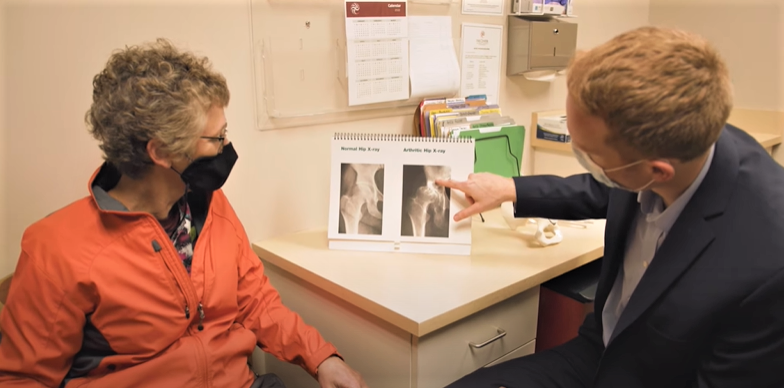
WHAT CAN’T I DO AFTER HIP OR KNEE REPLACEMENT?
Generally, once you have healed from your joint replacement surgery, the only activity that is highly discouraged is running, but be sure to check with your surgeon. You can still participate in other activities including working out, yoga, pickle ball, tennis, basketball, skiing, hiking, and biking. Total joint replacements are designed to get you back to the activities you enjoy.
WILL I SET OFF THE METAL DETECTOR AT THE AIRPORT?
It depends. Sometimes your new joint, which typically has several different types of metals in it, can set off the metal detector. Simply tell TSA that you have had one of your joints replaced and they will wand you and get you on your way.
HOW LONG WILL MY NEW JOINT LAST?
Total joint replacements typically last about 15-20 years. There have been several advances in the type of plastic that is used so the parts may even last longer. Recent data shows that hip and knee replacements need to be changed or redone at a rate of about 0.5-1% per year. This means that about 10-20% of joint replacements may need to be redone after 20 years, but 80-90% are still working great.
WHEN CAN I DRIVE AFTER MY JOINT REPLACEMENT SURGERY?
This can be different for everyone but usually by about 3-4 weeks. Patients with hip replacements usually get back to driving a week or two faster than patients with knee replacements. When you have had your right hip or knee replaced, you are a bit slower to get back to driving than when the surgery is done on the left. Before returning to driving, you need to be off all narcotic pain medication and also be able to react and drive safely.
Orthopedic surgeon, Dr. Connor King, recommends that when patients feel ready, they should first practice driving on an empty street or in the driveway. He also recommends practicing slamming on the breaks to see if that jarring movement causes too much pain.
WHAT ARE THE RISKS OF HAVING THIS SURGERY?
All surgeries can have complications either during or after the procedure. Your care team will discuss these risks in depth with you.
Occurring at a rate of about 1%, there is always a risk of having an infection. In some cases, your orthopedic surgeon can clean out the joint and change the modular parts. Other cases may require further surgery. Some other rare complications (~1-2%) include heart attack, stroke, blood clots, kidney failure, fracture, stiffness, dislocation, and the need for redo or revision surgery.
In this community seminar replay, Drs. King and Hall discuss total hip and knee replacements and how these procedures can relieve joint pain and get you back to what you love.
We’ve put together a free guide to help you better understand joint replacement preparation, orthopedic surgery, and recovery. If joint replacement surgery is the best solution for you, The Center’s orthopedic surgeons and support staff are ready to help you prepare for surgery and plan for a successful recovery. Click below to sign up and receive our free joint replacement guide.





